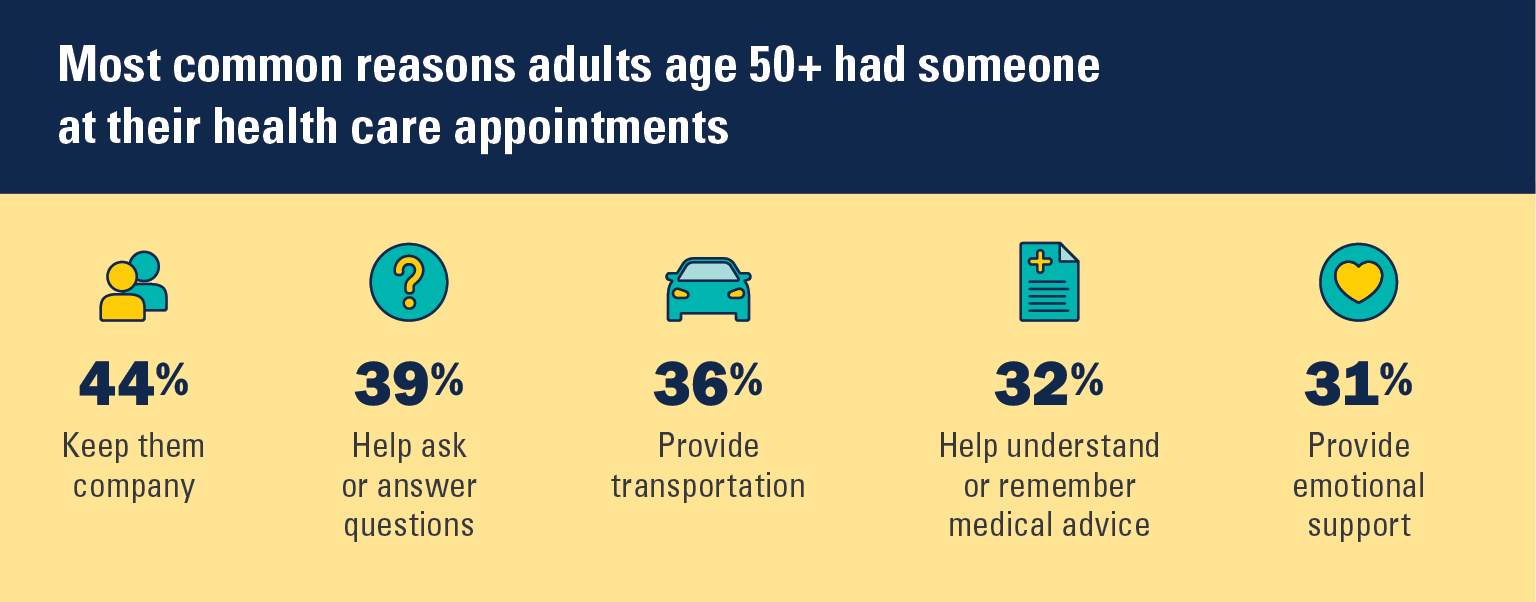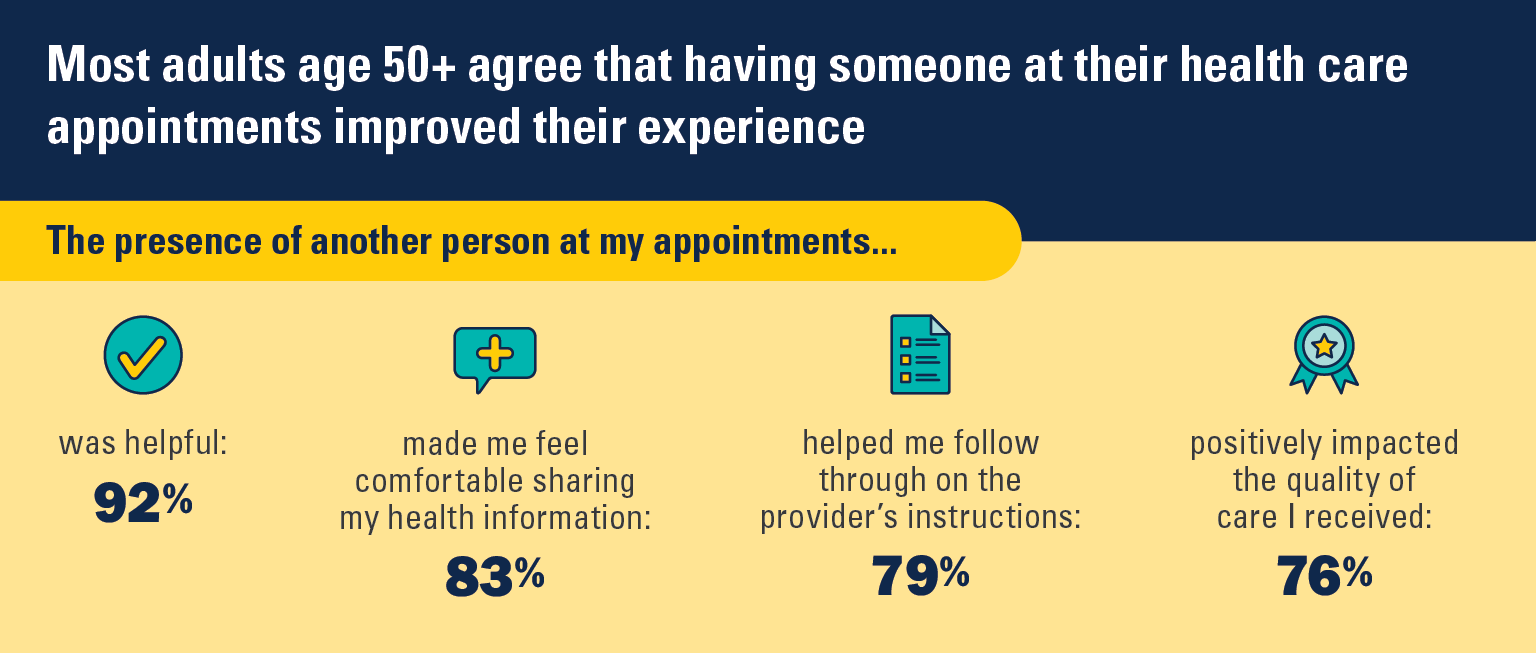
Key Findings
- 38% of adults age 50 and older had someone attend their health care appointments with them in the past year, most commonly to keep them company or to help ask or answer questions.
- 92% of older adults who had someone attend their health care appointments agreed that the presence of another person was helpful.
- 34% of adults age 50 and older attended the health care appointments of another person age 50 and older in the past year, most commonly to help ask or answer questions or to help understand medical advice.
Family and friends often support loved ones during health care appointments. This support can include asking and answering questions, taking notes, offering emotional support, providing transportation, and helping those with mobility challenges navigate health care settings. This report refers to those who provide this support during appointments as “health care companions.” In February 2025, the University of Michigan National Poll on Healthy Aging asked a national sample of adults age 50 and older about their experiences with and views on having a health care companion, as well as being a health care companion for someone else.
Having a health care companion
Of the 92% of people age 50 and older who had one or more health care appointments (including telehealth visits) in the past year, 38% said someone attended any of their health care appointments with them. This includes 4% who said someone attended their telehealth appointments. Men were more likely than women to report that someone attended their health care appointments with them (42% men vs. 35% women). Older adults more likely to have had someone at their health care appointments also included those age 65 and over, those with annual household incomes below $60,000, those reporting fair or poor physical health, and those with a disability that limits daily activities.
Why have a health care companion?
The reasons people age 50 and older had someone attend their health care appointments with them were to:
- Keep them company (44%)
- Help with asking or answering questions (39%)
- Provide transportation (36%)
- Help them understand or remember medical advice or instructions (32%)
- Provide emotional support (31%)
- Help with their physical / mobility challenges (13%)
About half of older adults (52%) reported that a health care companion came to an appointment with them for more than one of these reasons.
Who acts as a health care companion?
Adults age 50 and older said the following people attended their health care appointments:
- Spouse / partner (71%)
- Adult child (20%)
- Another relative (10%)
- Friend (5%)
- Someone else (5%)
Perceived benefits of having a health care companion
Most older adults who had a health care companion agreed that the presence of another person at their health care appointment was beneficial:
- 92% thought it was helpful
- 83% said it made them feel comfortable sharing their health information
- 79% believed it helped them follow through on the provider’s instructions
- 76% said it positively impacted the quality of care they received
Why not have a health care companion?
The majority of adults age 50 and older who had a health care appointment in the past year (62%) did not have someone attend their appointment with them.
When asked why no one attended their health care appointments with them, older adults reported the following reasons:
- Did not need help (80%)
- Preferred not to have someone with them (20%)
- Did not want to be a burden to others (11%)
- Did not have anyone who could come with them (6%)
- Privacy concerns (5%)
- The person who would go with them was unable (4%)
- Too complicated to involve someone else (3%)

Being a health care companion
In the past year, 34% of adults age 50 and older said they attended the health care appointments of another older adult, including 4% who attended another older adult’s telehealth visits. Women were more likely than men to have been a health care companion (38% women vs. 30% men).
Why be a health care companion?
The reasons people age 50 and older attended the health care appointment of another older adult were to:
- Help with asking or answering questions (63%)
- Help the person understand or remember medical advice or instructions (59%)
- Provide transportation (56%)
- Provide emotional support (48%)
- Keep the person company (42%)
- Help with the person’s physical / mobility challenges (31%)
The majority of health care companions (77%) attended an appointment for more than one of these reasons.
Helping someone else at their appointment
Older adults who served as health care companions for someone age 50 and older said they attended the appointment of the following people:
- Spouse / partner (58%)
- Parent (28%)
- Friend (11%)
- Another relative (10%)
- Adult child (4%)
- Someone else (3%)
Perceived benefits of being a health care companion
Most older adults who attended a health care appointment of someone age 50 and older agreed that their presence at the person’s health care appointment was beneficial:
- 99% thought it was helpful to the person
- 92% said it helped the person follow through on the provider’s instructions
- 89% felt it positively impacted the quality of care the person received

Implications
Our poll findings highlight the significant role that health care companions play in supporting older adults during health appointments. Nearly four in ten adults age 50 and older reported that someone accompanied them to a health care visit in the past year. These health care companions not only help with logistical needs such as transportation and mobility assistance, but also enhance communication, emotional well-being, and understanding of medical advice.
The positive perceptions of having a health care companion—from increased comfort to better perceived quality of care—suggest that older adults may want to consider inviting a trusted person to attend their medical appointments, especially in cases when they have questions and want to ensure they understand all information that is conveyed. A health care companion may also support older adults in telehealth visits or with accessing their patient portals.
The perceived benefits of health care companions suggest that health care providers and health systems should view companions not merely as visitors, but as important partners in care. Integrating the role of health care companions more deliberately into health care delivery could lead to more person-centered, effective, and compassionate health care experiences for older adults. For example, when appropriate and desired by older adults, providers can encourage patients to bring health care companions to appointments and invite health care companions to participate in discussions. This may be especially beneficial for patients with cognitive challenges, limited health literacy, or complex medical conditions.
Our poll findings show that certain populations—such as those with lower incomes, disabilities, or poorer health—may be more likely to rely on health care companions. This underscores the importance of addressing barriers that may prevent these individuals and others from being able to access this type of support, such as lack of available health care companions or concerns around privacy or potentially burdening others. Health systems can consider steps such as offering trained patient navigators or volunteers for older adults who would like a health care companion but do not have someone to join them for an appointment.
The high percentage of older adults serving as health care companions themselves—particularly women—points to a need for resources and support for these individuals. Training on how to effectively advocate during appointments, understand medical information, and manage follow-up care could empower health care companions and possibly improve health outcomes.
Taken together, our poll results highlight the unique value of health care companions and their potential to promote better health outcomes. As health systems and providers seek to deliver more person-centered care, recognizing and supporting the contributions of health care companions—whether family members, friends, or trained volunteers—can be a meaningful step toward ensuring that all older adults receive the care, clarity, and comfort they deserve.
Data Source and Methods
This National Poll on Healthy Aging report presents findings from a national household survey conducted exclusively by NORC at the University of Chicago for the University of Michigan’s Institute for Healthcare Policy and Innovation. This survey module was administered online and by phone from February 4th–28th, 2025, to a randomly selected, stratified group of U.S. adults age 50–97 (n=2,883), with an oversample of non-Hispanic Black, Hispanic, and Asian American and Pacific Islander populations. The survey completion rate was 32% among panel members invited to participate. The margin of error is +/- 1 to 3 percentage points for questions asked of the full sample and higher among subgroups. Percentages in this report may not add to 100% due to rounding.
Findings from the National Poll on Healthy Aging do not represent the opinions of the University of Michigan. The University of Michigan reserves all rights over this material.
Read past National Poll on Healthy Aging reports and about the poll methodology.
Citation
National Poll on Healthy Aging Team. How Health Care Companions Support Older Adults at Appointments. University of Michigan National Poll on Healthy Aging. September/October 2025. Available at https://dx.doi.org/10.7302/27354